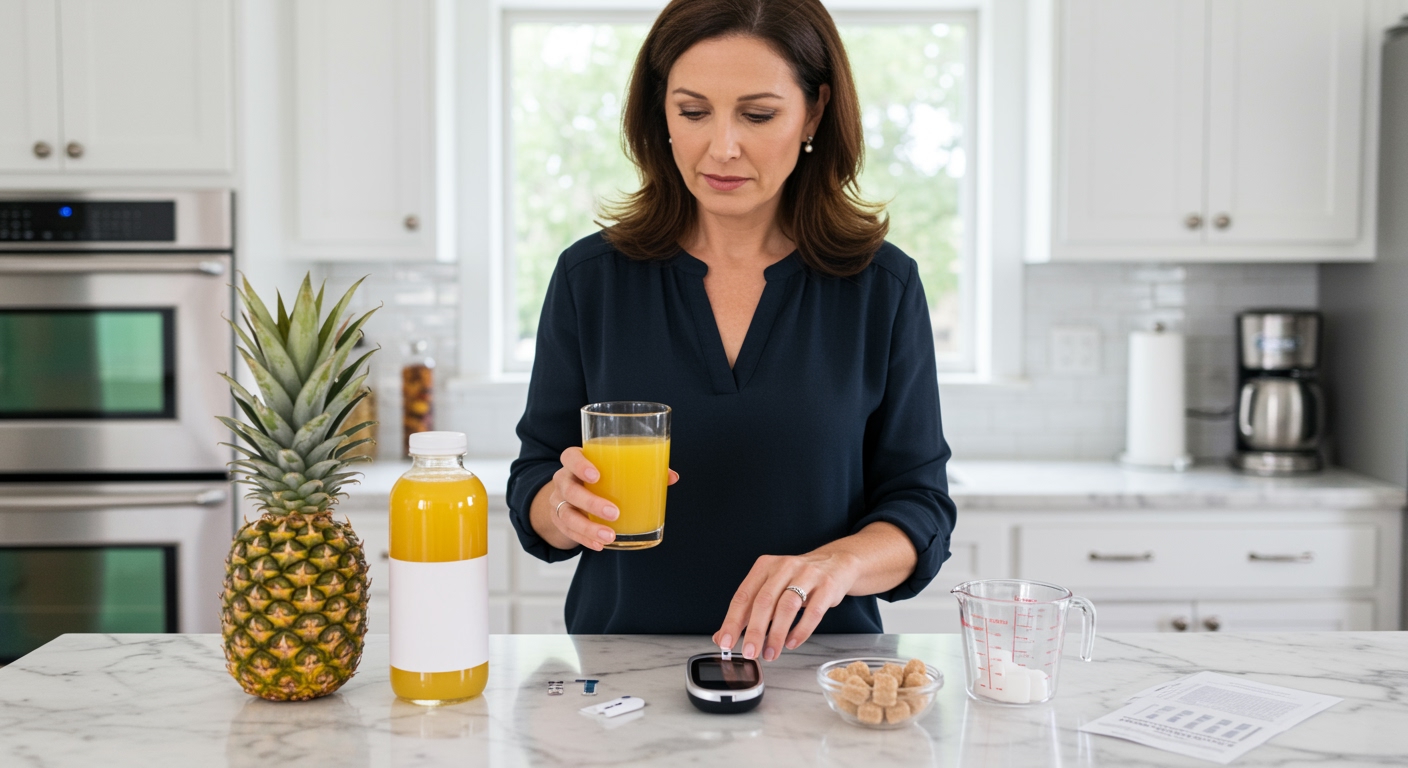✪ Key Takeaway: Pineapple juice can spike blood sugar rapidly due to its high sugar content and lack of fiber, making it risky for diabetes.
Introduction
You grab a glass of pineapple juice thinking you are making a healthy choice, but your blood sugar meter tells a different story an hour later.
Many people with diabetes wonder if this tropical drink fits into their meal plan because fruit juice seems healthier than soda or other sugary beverages.
Hi, I am Abdur, your nutrition coach and today I am going to explain exactly how pineapple juice affects your blood sugar and whether you should include it in your diabetes management plan.
What Makes Pineapple Juice Different From Whole Pineapple?
The juicing process removes most of the fiber that naturally occurs in whole pineapple fruit.
This fiber normally slows down sugar absorption in your digestive system and helps prevent rapid blood sugar spikes.
One cup of pineapple juice contains about 25 grams of sugar with virtually no fiber to buffer its absorption.
Your body treats this concentrated sugar similar to how it processes table sugar or candy.
The glycemic index of pineapple juice ranges from 46 to 66, which puts it in the medium to high category for blood sugar impact.
When you drink pineapple juice, the sugars enter your bloodstream within 15 to 30 minutes because there is no fiber to slow down the process.
This rapid absorption can cause your blood glucose levels to rise quickly, which is exactly what people with diabetes need to avoid.
✪ Fact: One cup of pineapple juice contains the sugar equivalent of about 6 teaspoons of table sugar.
How Does Pineapple Juice Affect Your Blood Sugar Levels?
Your pancreas must work overtime to produce enough insulin to handle the sugar rush from pineapple juice.
People with type 1 diabetes cannot produce insulin naturally, so drinking pineapple juice without proper medication adjustments can lead to dangerous blood sugar spikes.
Those with type 2 diabetes often have insulin resistance, meaning their cells do not respond properly to insulin signals.
This makes it even harder for their bodies to process the concentrated sugars in pineapple juice effectively.
Research shows that fruit juices can cause blood glucose levels to rise by 50 to 100 mg/dL within one to two hours of consumption.
The fructose in pineapple juice gets processed differently than glucose, going directly to your liver where it can contribute to fat storage and insulin resistance over time.
Regular consumption of high-sugar fruit juices like pineapple juice can make blood sugar control more difficult and may worsen long-term diabetes complications.
✪ Pro Tip: Test your blood sugar 1-2 hours after drinking any fruit juice to understand your personal response.
Are There Any Benefits Of Pineapple Juice For Diabetics?
Pineapple juice does contain some vitamins and minerals that can support overall health when consumed in moderation.
It provides vitamin C, manganese, and small amounts of other nutrients that your body needs for proper function.
The bromelain enzyme in pineapple juice may have anti-inflammatory properties that could potentially benefit people with diabetes.
However, these potential benefits do not outweigh the significant blood sugar risks for most people with diabetes.
You can get the same nutrients from whole pineapple in smaller portions, which provides fiber to help manage the sugar impact.
Some people use small amounts of pineapple juice to treat hypoglycemia or low blood sugar episodes because it raises glucose levels quickly.
But for regular consumption, the risks typically outweigh any potential benefits for diabetes management.
✪ Note: The vitamin C in pineapple juice can be obtained from lower-sugar sources like bell peppers or broccoli.
What Are Better Alternatives To Pineapple Juice?
Fresh pineapple chunks in small portions provide the same taste with added fiber to slow sugar absorption.
A quarter cup of fresh pineapple contains about 4 grams of sugar compared to 25 grams in a cup of juice.
You can dilute pineapple juice with water or sparkling water to reduce the sugar concentration while still enjoying the flavor.
Infused water with fresh pineapple pieces gives you taste without the concentrated sugar load.
Low-sugar vegetable juices or unsweetened beverages make better daily drink choices for blood sugar control.
If you do choose to drink pineapple juice occasionally, limit yourself to 2-4 ounces and pair it with protein or healthy fats to slow absorption.
Always monitor your blood glucose response and adjust your diabetes medications as recommended by your healthcare provider.
✪ Pro Tip: Mix 2 ounces of pineapple juice with 6 ounces of sparkling water for a refreshing low-sugar drink.
The Bottom Line
Pineapple juice poses significant risks for people with diabetes due to its high sugar content and rapid absorption rate that can cause dangerous blood sugar spikes.
When managing diabetes, every food choice either helps or hurts your blood sugar control, and pineapple juice typically hurts more than it helps.
I would love to hear about your experiences with fruit juices and blood sugar management, so please share your thoughts or questions in the comments below.
References
At NutritionCrown, we use quality and credible sources to ensure our content is accurate and trustworthy. Below are the sources referenced in creating this article:
- Healthline: Pineapples and Diabetes
- Glycemic Index Net: Pineapple Juice Unsweetened
- SugarFit: Pineapple Good Diabetes
- PMC: Fruit Juice and Diabetes Research





